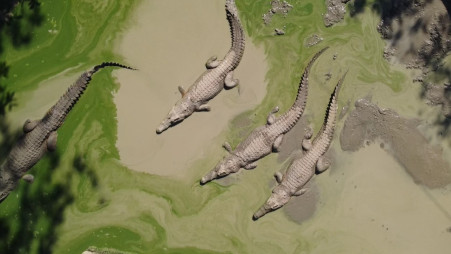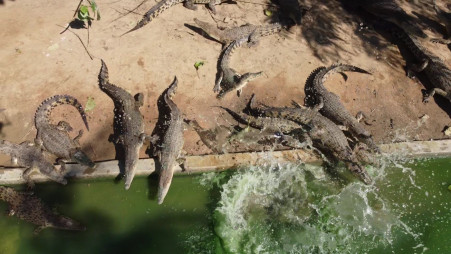Crocodile farming fetching foreign currency
The climate of Bangladesh is conducive to crocodile rearing

Highlights
● A crocodile lays 50-60 eggs in the rainy season
● About 400 crocodile hides are exported every year
● It takes Tk20,000 to raise a crocodile for export in 1.5-2 years
● 1 square centimetre of hide is sold for $15
● Belts, vanity bags, shoes, and other expensive items are made of crocodile hide
● Perfumes are made from crocodile bones
● Jewellery, various fancy items are made from crocodile teeth
● Crocodile meat is also sold abroad at $40-50 per kilogramme
● Crocodiles live between 80-100 years and lays eggs
Hatiber village of Uthura union in Shalban, 20 kilometres from Bhaluka upazila headquarters in Mymensingh, is now known as "Crocodile Village." Reptiles Farm Limited has built a large crocodile farm there and exported 1,507 crocodile hides to Japan, each costing $500, totalling Tk6 crore.
Reptiles Farm Ltd established the farm in 2004 on 15 acres of land with 75 crocodiles brought in from Malaysia. It has about 3,000 big and small crocodiles now. About 100 baby crocodiles are artificially produced every year from eggs during the breeding season.
In the rainy season, a crocodile lays 50-60 eggs. After hatching from these eggs, small crocodiles are transferred to hatcheries with great care, step-by-step. Exportable crocodiles are picked up from hatcheries and kept in separate sheds. After being kept there for six to eight months, the skin is separated from the crocodile and exported. At present, about 400 crocodile hides are exported every year.
Abu Saim Mohammad Arif, the manager of Reptiles Farm Ltd, who has been working on the farm since the beginning of the project, said there were many problems with crocodile breeding and survival in the beginning.
"At first, we could not find people to work on the farm. No worker would come because they were afraid. Later, workers were hired but they were ordinary people of the village, with no skills in rearing crocodiles. They have been trained by Australian trainers and now we have 25 employees," he added.

It takes about Tk20,000 to raise a crocodile for export in one-and-a-half to two years. Japan's Horiuchi Trading Company regularly buys hides from the farm. Bags, belts, shoes, etc., are made from these hides, he continued.
Abdur Rahim, who works as a labourer here and feeds the crocodiles, said at first he was scared but now the fear is gone. Broiler chicken and beef are provided as food for the crocodiles. He also collects eggs.
"I am still afraid to collect eggs as the mother crocodile always guards the eggs and at this time she is very excited. However, I have become habituated to this now," he said.
Deen Mohammad Dinu, an agronomist and deputy director of the public relations department at Bangladesh Agricultural University (BAU), has worked on crocodile farming and its export potential.
He said crocodile farming has potential and can be a very profitable sector as there is demand for it abroad. Many of the graduates from BAU have already set up crocodile farms in the country and are earning foreign currency.
"Crocodile skins, bones and teeth are exported at very high prices on the international market. One square centimetre of their hide sells for about $15. Leather belts, women's vanity bags, shoes, and many other expensive items are made. In addition, perfumes are made from crocodile bones, jewellery and various fancy items from teeth. Crocodile meat is also sold abroad at $40-50 per kilogramme; in a word, nothing of a crocodile is thrown away," he added.
Dr SMA Rashid, the crocodile farm project adviser at Reptiles Farm, said, "At first, patronage is needed. When we started, the government had little idea about this and there was no policy. Now, the policy has been made but this business is time-consuming. It is not that one starts a business and becomes a millionaire soon. One has to spend time there."
"A crocodile lives between 80 to 100 years and lays eggs. So, several generations can maintain the business. You have to keep in mind it is an expensive project and needs trained manpower. The government must also come forward to make this potential sector flourish," he added.
Monirul Khan, a professor in the Department of Zoology at Jahangirnagar University, said, "This is a very lucrative business and fully export-oriented. The supply is less than the demand for crocodile hide and meat on the international market. The climate of our country is conducive to crocodile rearing. They have fewer diseases, too. They can be reared for a long time with little food."

Since the wages of the workers in the country are low, the weather is favourable and it has demand on the international market, the sector can bring in foreign currency if the government pays attention, he added.
Many people will come forward if they are given low-interest loans. Also, new business areas will be created and employment will also increase, he added.
Apart from commercial crocodile farming, Reptiles Farm Limited has also created a shaded natural environment with 5,000 fruit and forest trees in the farm area.



 Keep updated, follow The Business Standard's Google news channel
Keep updated, follow The Business Standard's Google news channel
















